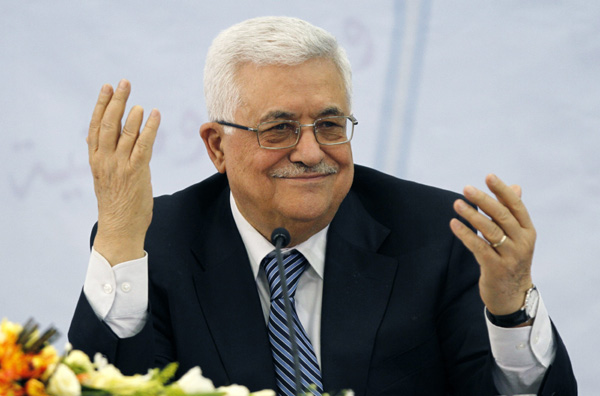Abbas to approach UN for full membership in Sept.
 0 Comment(s)
0 Comment(s) Print
Print E-mail
Xinhua News Agency, August 14, 2011
E-mail
Xinhua News Agency, August 14, 2011
Palestinian President Mahmoud Abbas will approach the United Nations for seeking a full membership of the independent state of Palestine on September 20 to boost the principle of the two-state solution, senior Palestinian officials announced on Saturday.
 |
| ?Palestinian President Mahmoud Abbas gestures during a Palestinian Liberation Organization (PLO) central committee meeting in the West Bank city of Ramallah July 27, 2011. |
Ahmed Majdalani, member of Palestine Liberation organization ( PLO) executive committee told Xinhua that President Abbas is to head the Palestinian delegation to the UN to officially demand the international recognition of the state of Palestine, which is established on the territories occupied by Israel in 1967 with east Jerusalem as its capital, as a full UN member.
"President Abbas will chair the Palestinian delegation to attend the annual convention of the UN General Assembly in September," Majdalani said, adding that Abbas will hold a meeting with the UN Secretary General Ban Ki-Moon on Sept. 20 in New York to present the Palestinian request. The United States and Israel have announced they oppose the Palestinians' "unilateral move."
"After the meeting with Mr. Ban, President Abbas will address a speech to the UN General Assembly on the 22 or the 23 of September. He would frankly demand the international community to recognize the state of Palestine as an independent state," said Majdalani.
"Recognizing the statehood by the UN is the only way to keep the principle of the two-state solution and to achieve comprehensive peace in the region," said the PLO official, adding that the Arab and Palestinian efforts are going on all levels to gain the largest international support for the move.
Meanwhile, the Palestinian official news agency Wafa on Saturday quoted President Abbas as saying that a UN vote on an independent Palestine boosts the principle of two-state solution with Israel. The Palestinians want a state on the territories occupied by Israel during the 1967 Arab-Israeli war.
"Going to the UN doesn't contradict with the core of the peace process; it is not a unilateral measure that aims at isolating Israel," Abbas said.
Abbas had earlier said during a meeting with the U.S. consul in Jerusalem Daniel Rubenstein that the reason the Palestinians have decided to approach the UN is the Israeli government's stubbornness and its rejection to be committed to the international agreements and conventions.
The Palestinian decision to ask the General Assembly to vote on the statehood next month "came as a result of the Israeli refusal of all attempts to start a real, serious negotiations to end the occupation," Abbas told members of his Fatah party during a meeting.
U.S.-brokered peace talks between the Israeli and Palestinian sides stopped shortly after one month in October 2010 over disputes of two sides over the resumption of settlement building in the West Bank and east Jerusalem. Israel, however, has recently approved new housing projects of 4,300 units in Jewish settlements built on the occupied east Jerusalem.
Meanwhile, the Palestinian National Authority (PNA) foreign minister Reyad al-Malki told reporters that the Palestinian leadership had chosen September to approach the UN "because it coincides with Lebanon's turn to chair the international organization."
"According to the UN laws, the applicant country that wants to join the organization's General Assembly should officially apply 35 days before the assembly holds its annual convention," said al- Malki, adding "however, there are exceptions similar to the case of South Sudan."
Asked about the possibility that the United States may demand the UN to postpone the Palestinian request, al-Malki said "this might happen as it happened before, and this will be left to the chairman, which will be Lebanon and the member states."





